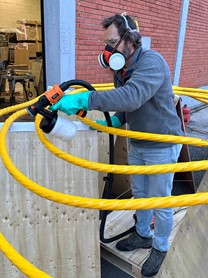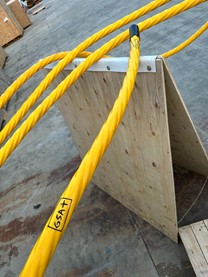The ocean is a complex biogeochemical environment for the collection of EOVs observations and data. Monitoring equipment in underwater and seabed environments must withstand cold water and high pressures in deep-sea areas, it is affected by the corrosion of seawater, and biofouling in shallower areas: the accumulation of microorganisms, plants, algae, or small animals on wet surfaces. Biofouling can make it difficult to keep platforms and equipment clean and operational: nowadays, in fact, continuous maintenance of underwater infrastructures is required.
Let’s explore the SEASNAKE – Sea trials for biofouling of a dynamic umbilical, the project within the EMSO Physical Access Program, awarded through a competitive tender to the RISE Research Institutes of Sweden which is taking place at Western Mediterranean Sea, the EMSO Regional Facility located in the North-Western Mediterranean at 80km offshore, with the aim to face the biofouling issue during a long-term exposure in an offshore scenario.
With the technological and logistical support of the Western Mediterranean Sea Regional Team, the RISE group is testing the use of special materials to protect equipment that must to be deployed in the ocean. The aim is to validate at sea in operational condition new mateable cables, with robust resistance to corrosion and fouling, of 3×30 m long designed for offshore activities.
Within the SEASNAKE project the cables will be validated simultaneously on the Western Mediterranean Sea (W1M3A) EMSO Regional Facility with three different configurations: reference sample with (1) no protection, (2) painted, and (3) painted with antifouling protection. The capability to assess the performances deploying at the same time three different configurations will allow for the first time to analyse the effectiveness of painting and anti-fouling painting on the thermoplastic polyester elastomer used as insulation under different oceanographic conditions due to the intrinsic variability of the ocean during different seasons.
On May 4th, a cable triplet was deployed at different depths attached to spar buoy in the Western Mediterranean Sea. Each triplet hosts three pieces of a nano cable (12 fibres) developed by NKT (NKT A/S Denmark Vibeholms Allé 202605 Brøndby). The cables are intended for permanent installation in underwater and are flexible, which makes them suitable for applications with mobile stations/platforms, as well as for offshore use.



Cables treatment (Credit photos: GreenSailor)
Involved partners:
- RISE
- NKT
- I – Tech
- Green Sailor
- Geico Taiki-Sha
To know more about RISE, visit the website
For more details about the Western Mediterranean Sea Regional Facility, click here
Have a look at the EMSO Physical Access Call 2023, there is still time to apply!


